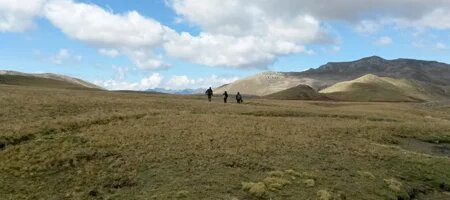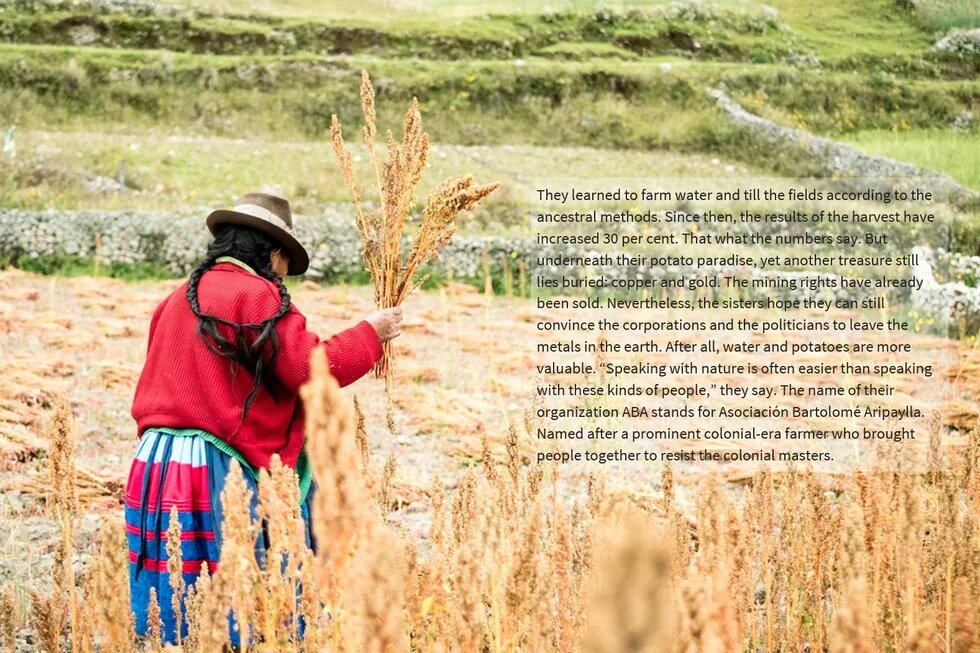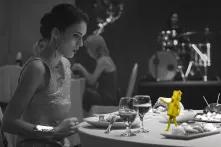

The multimedia scroll documentation "Ackerbunt" by Jakob Fuhr, Christine Anas and Elisabeth Weydt is one of six winning projects presented at "EcoFair Media – Good food for all!" that artistically and substantively tackle the issue of the human right to food.
"Ackerbunt" tells the success story of the Quechua farmers in the southern Peruvian highlands, who revived their old farming traditions in order to become independent of the market and external aid as well as stand up against climate change.
We did not know much about the Quechua sisters and their fields which produce several hundred varieties of potatoes 3,000 metres above sea level. But the very fact that they could cultivate several hundred potato varieties at an altitude of 3,000 metres, although everyone else complained of soil erosion and climate change, hinted that it might be an interesting story. Our contact by e-mail beforehand was sparse. We knew that the fields were somewhere near Ayacucho, and the sisters agreed that we could come and said it would probably be harvest season.
It really was the harvest season and the start of almost a fortnight of jacket potatoes with cheese. Very delicious jacket potatoes with very delicious cheese. But occasionally we took the liberty of ringing the changes – in the first tourist restaurant on the plaza in Ayacucho.
Magda and Marcela welcomed us warmly and drove us through their little empire. We spent several days up in the Andes. By day we learned about their traditional plant cultivation methods and their history, at night we marvelled at the stars and tried to get a bit of sleep under ten alpaca blankets in spite of the incredibly cold temperatures. We were surprised how much energy the Machaca sisters had. It seemed that they never slept and always had a few warm or teasing words for everyone they met. The rather austere Marcela and the girlish Magda supplemented each other perfectly, and perhaps this was the reason they never got married.
We were able to take part in the water festival, a festival in the honour of Pachamama and Mama Agua. We set out from the old colonial town of Ayacucho at 2 o'clock at night and drove up high into the mountains in the all-terrain car. In the luggage area was an enormous pot of quinoa soup which the sisters had cooked the evening before. On the back seat were three sisters and one author. Whenever the car passed a police check, one of them had to hide under the blanket in the foot well. When we reached the top, we had three plates of soup for breakfast and several glasses of Schnaps to ensure that Pachamama would continue to provide water and fertility over the coming years.
We learned that the greatest feat was not the 400 or so varieties of potato that they cultivated up here, it was their community and the lagoons which they had created, without which all these varieties of potatoes, quinoa, maize and other plants would not exist. The Quechua sisters made water grow. Only then could the many vegetables develop. Almost a bit like God - but for real. And that was just a little bit awe-inspiring.
Back in Germany and Austria, we then tried to pass our impressions on to the other members of the team. The illustrator, the musicians and the programmer. And they really are all fascinated and are working to make it a coherent story. We skype, send each other files, and sometimes we even meet together.
